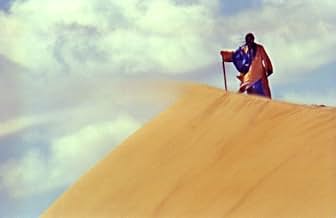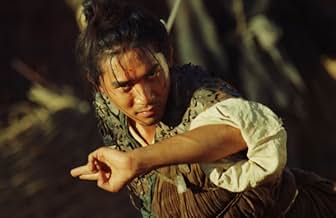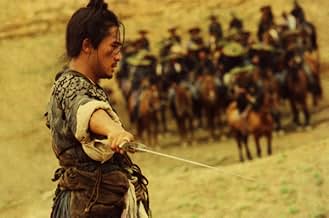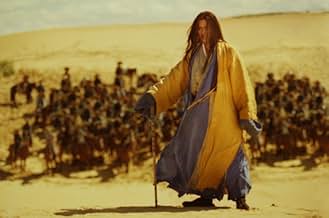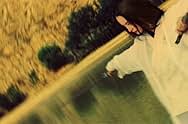IMDb रेटिंग
7.0/10
18 हज़ार
आपकी रेटिंग
अपने टूटे दिल को लिए हिटमैन रेगिस्तानी इलाके में चला जाता है जहां वह एक ऐसे कुशल तलवारबाज से मिलता है जो सुपारी लेकर उसके लिए हत्याएँ करता है.अपने टूटे दिल को लिए हिटमैन रेगिस्तानी इलाके में चला जाता है जहां वह एक ऐसे कुशल तलवारबाज से मिलता है जो सुपारी लेकर उसके लिए हत्याएँ करता है.अपने टूटे दिल को लिए हिटमैन रेगिस्तानी इलाके में चला जाता है जहां वह एक ऐसे कुशल तलवारबाज से मिलता है जो सुपारी लेकर उसके लिए हत्याएँ करता है.
- पुरस्कार
- 9 जीत और कुल 13 नामांकन
Tony Leung Chiu-wai
- Blind Swordsman
- (as Tony Chiu Wai Leung)
Collin Chou
- Swordsman
- (बिना क्रेडिट के)
Shun Lau
- Leader of Ouyang's Opponents in Opening Battle
- (बिना क्रेडिट के)
Li Yin
- Rebel swordsman
- (बिना क्रेडिट के)
फ़ीचर्ड समीक्षाएं
"Ashes of Time Redux" is Wong Kar Wai's venture into the martial arts genre. However, energetic action and narrative clarity take a backseat to the visual poetry that contemplates wounded hearts, loneliness and the memories of lost love that cut deeper than any sword. Best appreciated as a sensory experience, "Ashes of Time Redux" unfolds as a series of beautiful yet melancholic images like the soft brush strokes of a Chinese landscape painting. Even the sword fights are shot as swirling, hallucinatory dreamscapes. The haunting desert landscape gorgeously captured in saturated colors by cinematographer Christopher Doyle, a brooding cello score by Yo-Yo Ma and the beauty of the actors (an all-star Hong Kong cast) contribute to a movie experience that both pleases the senses and engages the heart.
'Dung Che Sai Duk' (aka 'Ashes of Time') is a beautiful visual tapestry. It is another fine example of poetry on canvas. The story does not follow a linear structure but at the same time the dazzling visuals grip the viewer and involve us in the characters' life. The first time I watched 'Dung Che Sai Duk' I was engaged throughout the entire duration but by the end I was left a little confused. This is because I overlooked the layers and some of the important details. It also didn't help that the subtitles were poor. After second viewing, this time with better subtitles, it became a lot more clearer and my appreciation has increased much more.
Almost the entire film is set in the desert. There are plenty of swordfights to enjoy but this is secondary to the story which is mainly about unrequited love and how the fights are a projection of their anger and way of dealing with rejection. The fight scenes are well choreographed. However, I felt slow motion was overused. The editing is good but I was disappointed that so many sequences were cut from the Redux version. The dialogues are marvelously poetic. The tricky cinematography is conducted through various angles and so astonishingly effective. The soundtrack is superb and atmospheric. The cast boasts of top talented names like, Leslie Cheung, Maggie Cheung, Brigitte Lin, Tony Leung Chiu Wai, Jacky Cheung and Carina Lau all of whom do full justice to their roles with subtle performances.
Kar Wai Wong is known for experimenting with different themes and here he does that with unrequited love. Although the treatment of the story is slightly different when compared to his other works, the same essence remains within the characters. It is a movie that stays with you and invites you to revisit.
Almost the entire film is set in the desert. There are plenty of swordfights to enjoy but this is secondary to the story which is mainly about unrequited love and how the fights are a projection of their anger and way of dealing with rejection. The fight scenes are well choreographed. However, I felt slow motion was overused. The editing is good but I was disappointed that so many sequences were cut from the Redux version. The dialogues are marvelously poetic. The tricky cinematography is conducted through various angles and so astonishingly effective. The soundtrack is superb and atmospheric. The cast boasts of top talented names like, Leslie Cheung, Maggie Cheung, Brigitte Lin, Tony Leung Chiu Wai, Jacky Cheung and Carina Lau all of whom do full justice to their roles with subtle performances.
Kar Wai Wong is known for experimenting with different themes and here he does that with unrequited love. Although the treatment of the story is slightly different when compared to his other works, the same essence remains within the characters. It is a movie that stays with you and invites you to revisit.
Although I enjoy them, I seldom re-watch slow and introspective movies. Ashes of Time is the exception to the rule, as it haunts me so much that I have already given it three viewings! It may be because of the wonderful pictures, the essential yet poignant dialogues or the grave & epic music, nevertheless Ashes of Time is a fascinating movie!
Set in a tavern in the middle of the desert, it tells us stories of different swordsmen and deals with the theme of unrequited love. All the people, in fact, had to face a rejection.. and now strive to find a way to overcome the delusion and go on with their life. Swordsmanship is mostly viewed as an outlet to bring out the inner passions and frustrations.
The protagonist, Ouyang Feng [Leslie Cheung] is one of those swordsmen, who left his lady [Maggie Cheung] and his village to pursue fame and glory, convinced that she would have waited for him to return. Now instead he faces loneliness and the fact that she has married his elder brother.
The most peculiar aspect of the movie is the pictures, so beautifully shot that each still can make a wonderful portrait. Even the battles, rather than being filmed continuously, are rendered as a sequence of separate shots, thus remaining more indelibly impressed in our head. Indeed, the movie also focuses about memory (whom the movie title probably refers to) and its power to keep alive moments of the past, that otherwise would perish in the flow of time. Highly recommended! 9/10
Set in a tavern in the middle of the desert, it tells us stories of different swordsmen and deals with the theme of unrequited love. All the people, in fact, had to face a rejection.. and now strive to find a way to overcome the delusion and go on with their life. Swordsmanship is mostly viewed as an outlet to bring out the inner passions and frustrations.
The protagonist, Ouyang Feng [Leslie Cheung] is one of those swordsmen, who left his lady [Maggie Cheung] and his village to pursue fame and glory, convinced that she would have waited for him to return. Now instead he faces loneliness and the fact that she has married his elder brother.
The most peculiar aspect of the movie is the pictures, so beautifully shot that each still can make a wonderful portrait. Even the battles, rather than being filmed continuously, are rendered as a sequence of separate shots, thus remaining more indelibly impressed in our head. Indeed, the movie also focuses about memory (whom the movie title probably refers to) and its power to keep alive moments of the past, that otherwise would perish in the flow of time. Highly recommended! 9/10
Near the end, the proprietor of an inn perched on the windy edge of a sandy desert that stretches to the horizon has an epiphany; he has never before actually stopped to observe the desert, not as a transition, but as destination, as something that you don't calculate how to cross, but observe as a place you have crossed to reach. I have written the almost exact same idea (different setting) in one of my screenplays. This is the personal connection with a favourite film I value so much. Film becomes more than film, I see film as dream, a consciousness briefly shared then forgotten. It's that feeling of dreaming the same dream with a great artist that makes me tingle.
This is a film like the best of novels, a web woven of fragmented image and word, drives and desires, rendered cinematically alive when the two coalesce to reveal yawning chasms of human experience, the one common shared human experience we all know. The film's opening serves as present tense and WKW builds fascinating removes from it to the point where the final story of the film climaxes in the past with shocking reverberations that make me rush through the entire film, clawing my way back to the present and previous past occurrences, to change my perspective.
At the beginning of the film, a master swordsman arrives at an inn to offer the inn keeper a gulp from a wine that makes you forget the past. The inn keeper refuses. Throughout the film we happen upon characters, or characters happen upon the film as it passes time in that wind-torn inn by the desert, fixed in position by memory, by their inability or willinglessness to let go a human passion or folly, revenge or love however distant and impossible. We all need something to live for the inn keeper muses, and we know sometime we'll cling to the uglier most obsessive aspects of our nature to get us through the night. But this is all we have, not something to separate us from animals because even a dog will come to know the hand that strikes it, but all we have as humans to distinguish us from creation, being able to cling to that sad bitter memory of unfulfillment for years and make our unvanquished madness dear to us.
This is all a bit of a game, life is through the remove of storytelling, it becomes myth and fabrication, but what wouldn't we give to go back and play it again. In the end we discover that the wine that makes you forget the past is regular wine and a character is only set free when he finds out his love, love he had and denied until he realized how precious it was to him and came back to find it gone, has died. But that was already two years ago and he's stood in place for those two years, allowing himself to be released from his selfimposed exile when a piece of paper reaches his hands, as though even absolution from guilt or shame or obligation can only properly come to pass in an official manner.
WKW gives us swordplaying spectacle to go with this but he doesn't focus on it. Swords strike and fighters leap into the air in blurry shapes of color and motion yet the eye doesn't rest on the details of the fight but rather centers on facial expressions and the maddening ferocity of it all, like it's all a dance and we're dancing right in the middle of it. To say this is a wuxia is to set different expectations for it. Here poetry is not a poetry of appearances. As with his previous films, WKW tells us marvellous things about obsession and release, the yearning to remember and forget, and about letting ourselves go into new beginnings.
This is a film like the best of novels, a web woven of fragmented image and word, drives and desires, rendered cinematically alive when the two coalesce to reveal yawning chasms of human experience, the one common shared human experience we all know. The film's opening serves as present tense and WKW builds fascinating removes from it to the point where the final story of the film climaxes in the past with shocking reverberations that make me rush through the entire film, clawing my way back to the present and previous past occurrences, to change my perspective.
At the beginning of the film, a master swordsman arrives at an inn to offer the inn keeper a gulp from a wine that makes you forget the past. The inn keeper refuses. Throughout the film we happen upon characters, or characters happen upon the film as it passes time in that wind-torn inn by the desert, fixed in position by memory, by their inability or willinglessness to let go a human passion or folly, revenge or love however distant and impossible. We all need something to live for the inn keeper muses, and we know sometime we'll cling to the uglier most obsessive aspects of our nature to get us through the night. But this is all we have, not something to separate us from animals because even a dog will come to know the hand that strikes it, but all we have as humans to distinguish us from creation, being able to cling to that sad bitter memory of unfulfillment for years and make our unvanquished madness dear to us.
This is all a bit of a game, life is through the remove of storytelling, it becomes myth and fabrication, but what wouldn't we give to go back and play it again. In the end we discover that the wine that makes you forget the past is regular wine and a character is only set free when he finds out his love, love he had and denied until he realized how precious it was to him and came back to find it gone, has died. But that was already two years ago and he's stood in place for those two years, allowing himself to be released from his selfimposed exile when a piece of paper reaches his hands, as though even absolution from guilt or shame or obligation can only properly come to pass in an official manner.
WKW gives us swordplaying spectacle to go with this but he doesn't focus on it. Swords strike and fighters leap into the air in blurry shapes of color and motion yet the eye doesn't rest on the details of the fight but rather centers on facial expressions and the maddening ferocity of it all, like it's all a dance and we're dancing right in the middle of it. To say this is a wuxia is to set different expectations for it. Here poetry is not a poetry of appearances. As with his previous films, WKW tells us marvellous things about obsession and release, the yearning to remember and forget, and about letting ourselves go into new beginnings.
Without a doubt, Ashes of Time is a beautiful, deeply felt movie. The acting and cinematography are outstanding. The color and camera angles are poetic. But the DVD quality is barely acceptable and the plot, what there is of it, is very confusing. The movie is less a journey from point A to point B than it is a dream-like dance around a central theme: regret for the way we treat those we love.
For those who would watch the movie for the martial arts-- the main characters are mostly swordsmen and martial artists-- the movie is less than satisfying. The fight scenes are highly stylized, employing fast cuts, blurs of motion, and disorienting lighting and camera angles. The fight scenes are more about camera technique than martial arts technique.
Ashes of Time is not a movie that can be absorbed in one viewing. For many viewers, though, it will be worth a second or even third.
For those who would watch the movie for the martial arts-- the main characters are mostly swordsmen and martial artists-- the movie is less than satisfying. The fight scenes are highly stylized, employing fast cuts, blurs of motion, and disorienting lighting and camera angles. The fight scenes are more about camera technique than martial arts technique.
Ashes of Time is not a movie that can be absorbed in one viewing. For many viewers, though, it will be worth a second or even third.
क्या आपको पता है
- ट्रिवियाThis film had an exhausting effect on Wong Kar-Wai. While on hiatus during the editing process he wrote and shot Chungking Express (1994) to "clear his head".
- भाव
Ou-yang Feng: People say, when you can't have what you want, the best you can do is not to forget.
- इसके अलावा अन्य वर्जनWong Kar-wai revisited the film and created the Redux version which premiered at the Cannes Film Festival 2008. This version has alternative footage and changes in the order of scenes. The Redux version has new opening titles, and the season's fade-ins introducing each chapter are new. It also has a new color-scheme and a new soundtrack. Some scenes from the original version have been deleted, for example the two main character's introduction in the beginning. The overall run time of the Redux version is slightly shorter than the original theatrical version.
- कनेक्शनFeatured in Century of Cinema: Naamsaang-neuiseung (1996)
टॉप पसंद
रेटिंग देने के लिए साइन-इन करें और वैयक्तिकृत सुझावों के लिए वॉचलिस्ट करें
विवरण
- रिलीज़ की तारीख़
- कंट्री ऑफ़ ओरिजिन
- आधिकारिक साइटें
- भाषाएं
- इस रूप में भी जाना जाता है
- Ashes of Time
- फ़िल्माने की जगहें
- उत्पादन कंपनियां
- IMDbPro पर और कंपनी क्रेडिट देखें
बॉक्स ऑफ़िस
- बजट
- HK$4,00,00,000(अनुमानित)
- US और कनाडा में सकल
- $1,74,273
- US और कनाडा में पहले सप्ताह में कुल कमाई
- $21,372
- 12 अक्टू॰ 2008
- दुनिया भर में सकल
- $20,09,694
इस पेज में योगदान दें
किसी बदलाव का सुझाव दें या अनुपलब्ध कॉन्टेंट जोड़ें







